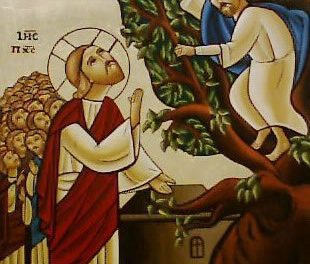DEUT 18:15-20
PS 95:1-2, 6-7, 7-9
1 COR 7:32-35
MK 1:21-28
 The theme of our readings this week is prophetic authority. This is a tricky subject for contemporary readers. We are socialized to be dubious of authority, to distrust those who claim to speak with authority, especially religious authority tied to Jesus’ own prophetic power. The sex abuse crisis has especially made us skeptical of religious leaders, and this isn’t necessarily a bad thing. It is good to be reminded that ecclesiastical endorsement does not guarantee goodness, and that the words of one in a roman collar may indeed ultimately come from the Adversary himself.
The theme of our readings this week is prophetic authority. This is a tricky subject for contemporary readers. We are socialized to be dubious of authority, to distrust those who claim to speak with authority, especially religious authority tied to Jesus’ own prophetic power. The sex abuse crisis has especially made us skeptical of religious leaders, and this isn’t necessarily a bad thing. It is good to be reminded that ecclesiastical endorsement does not guarantee goodness, and that the words of one in a roman collar may indeed ultimately come from the Adversary himself.
Nevertheless, our readings this week call us to focus on Jesus’ prophetic ministry and to question where (and how) we might find prophetic authority today. In our gospel from Mark, we hear that Jesus “taught them as one having authority and not as the scribes.” Here, we see a clear contrast with Jesus’ authority and the authority of his adversaries. The Pharisees and scribes presume to speak with authority precisely because of their position in the Jewish hierarchy. They possess the office to which authority is attached. Jesus, on the other hand, has authority because his words have power. Despite not having the backing of the institutional leaders, Jesus “commands even the unclean spirits and they obey him.”
In fact, Jesus is so powerful that recognizing him as “the Holy One of God,” the Messiah, is a trope throughout Mark. Jesus is presented to us in power. In the first story of his baptism, the heavens open as God declares publicly his endorsement of “his Son.” Jesus immediately begins curing and healing. He is so powerful that nobody can keep quiet. The leper he heals at the end of the first chapter, in fact, explicitly disobeys Jesus’ command to keep quiet about Jesus healing him. He has to tell people. And so it is no wonder that even the demons know who Jesus is. As Sandra Schneiders writes in her own look at religious life and prophetic authority,
During his public life, his authority flowed from what he did and said. No one can confer, and no one can “claim,” moral authority. It belongs only to one earns it. Jesus was powerfully, personally authoritative and that is why he was recognized as a prophet.
But Mark has an interesting take on recognizing Jesus’ authority. While it is true that throughout the gospel, people are constantly identifying who He is (the messiah, the Son of God), they miss the ultimate meaning of his identity until the crucifixion. While the confession of Jesus’ lordship, his authority, is based in his power, Jesus is constantly explaining throughout Mark that his power is precisely what he is going to lose. He is the messiah, but a suffering messiah, one who will be rejected and killed.
Thus we come to second characteristic of Jesus’ prophetic authority: it is a power that is integrally tied to suffering and persecution. It is an authority that can willingly face obliteration precisely because it is so powerful. In fact, death reveals precisely how powerful Jesus’ authority is for it cannot overcome him.
How do we move from Jesus’ own prophetic authority to our own time and our own need to discern which of our own authorities actually speaks for God? If we look at the first characteristic of Jesus’ prophetic ministry—his power which stems from his actions and not his office or hierarchical position—we might infer that the true prophet is one who has something other than words. Like Sandra Schneiders said of Jesus in the above quote, the true prophet needs to earn it. He needs to walk the walk. The prophet’s life must bear out the meaning of his words.
Second, the prophet must have a certain freedom to follow Jesus up the path of Calvary and share in his persecution. This brings us to our second reading, which I cannot fail to mention in part because of its complex and indeed controversial message. Paul writes to the Corinthians that it is better not to marry.
I should like you to be free of anxieties.
An unmarried man is anxious about the things of the Lord,
how he may please the Lord.
But a married man is anxious about the things of the world,
how he may please his wife, and he is divided.
An unmarried woman or a virgin is anxious about the things of the Lord,
so that she may be holy in both body and spirit.
A married woman, on the other hand,
is anxious about the things of the world,
how she may please her husband.
If we think about Paul writing about holiness, we would have to conclude that his message is archaic. We know that holiness is the call not only for those set apart (i.e. those in religious life) but also those leading the active life too. Marriage and children and other worldly cares are opportunities, not impediments, for the growth in holiness. But if we think of Paul writing about a certain freedom of attachment to follow Christ to the cross in order to more perfectly bear out the meaning of the prophetic message, we might be more willing to take Paul at his word. Schneiders again writes:
Besides an intense life of prayer which unites the prophet to God, a second requirement of prophetic identity and mission is a certain freedom from attachments which pressure the person to prefer personal or institutional goods, the maintaining of the status quo within which one’s own position and interests are protected, to God’s interests or the good of those to whom one is sent. Jesus was extraordinarily “unattached,” not only inwardly, but even in his personal lifestyle. By his own choice, he had no family to provide for or to protect. He owned no personal property that he could lose. He held no official position of power, political or ecclesiastical, that his actions could jeopardize.
There is a truth here. While I might feel compelled to invite the homeless to sleep in my bed or the hungry to share a table with me, prudence would dictate that with an infant in one arm and a toddler in the other, I am not in a place where I can always take such risks. I have a family to protect. There is a tension here in the Christian life, to be sure, but I think that what Paul is pointing us to recognize is that the active life and family in particular has a set of duties which do not always allow us the most direct path toward a prophetic existence in both word and action.
Ultimately, the task of the prophet is to point us to God, the source of all power and authority. The prophet ought to reveal to us that words have power precisely because they point us to the Word, the author of the universe who spoke and the worlds came to be. But we must be critical listeners if we are indeed going to “hear his voice.”



